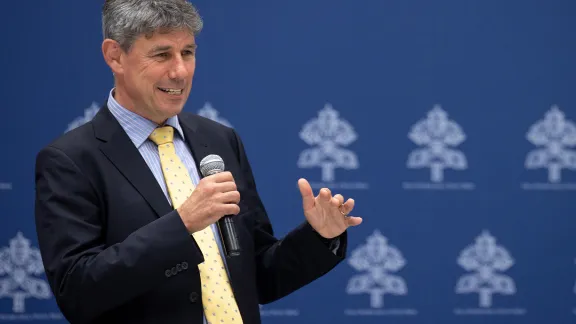As the Caritas network of Catholic aid and development agencies elects a new leadership team, LWF highlights the importance of longstanding ecumenical cooperation in humanitarian response

The newly elected Secretary General of Caritas Internationalis, Alistair Dutton. Photo: Daniel Ibáñez
As Caritas elects new leadership and governance, LWF reaffirms commitment to humanitarian cooperation
(LWI) - The Lutheran World Federation (LWF) has congratulated the leadership and governance of Caritas Internationalis and reaffirmed its commitment to collaborating in response to the needs of the world’s most marginalized communities.
In mid-May, Caritas, the global confederation of Catholic aid and development agencies, held its General Assembly in Rome and elected a new Secretary General, Alistair Dutton from Caritas Scotland (SCIAF), as well as a new President, Archbishop Tarcisius Isao Kikuchi from Japan and Vice-President Kirsty Robertson from Caritas Australia.
After travelling to Rome to attend the Assembly, Maria Immonen, director of LWF’s World Service department, noted that “collaboration and humanitarian work between Catholics and Lutherans goes right back to the birth of LWF in the aftermath of the Second World War.” In Germany, she said, Catholics and Lutherans “worked side by side to provide assistance to the many refugees who were moving around the globe during those times.”
Support for the most vulnerable
Over the decades, Immonen continued, LWF and Caritas have continued to work closely together to support vulnerable people facing large scale disasters or conflict. “One of the closest collaborations was in Sudan, before the independence of South Sudan, where there was a formalized, legally registered body of Catholics and Lutherans serving people impacted by that long running civil war.”
Caritas leader Dutton also recalled working alongside LWF colleagues and partners in Sudan while serving in a previous role as humanitarian director for the global Catholic network. “I have worked very closely with LWF and other Christian humanitarian organizations at various time throughout my career,” he said, describing these partnerships as “vibrant expressions of God’s love for those who are most vulnerable, and of the Christian duty to care for our neighbors.”
Dutton continued: “Ecumenical collaboration in humanitarian response is very important to me, both because of the message that it presents of Christian unity caring for the poorest on the peripheries, and because we are more effective when we work well together. As Caritas Internationalis’ new Secretary General, I am deeply committed to continuing our cooperation with LWF, the ACT Alliance, other Christian agencies and those of other faiths.”
Strengthened commitment to stand together
In 2016, during the joint commemoration of the 500th anniversary of the Reformation, Pope Francis joined former LWF President Bishop Munib Younan and General Secretary Rev. Dr Martin Junge for a celebration in Malmö, Sweden, which included the formalization of this partnership through a Declaration of Intent between Caritas and LWF. That commitment was further strengthened by the signing of a ‘Common Vision’ statement by Immonen and former Caritas Secretary General Aloysius John in Rome in 2021.
This global partnership has led to progress at local level in other parts of the world including Nepal, where both organizations have signed a country level agreement to promote closer cooperation on development projects such as clean water supplies for rural communities. LWF is currently working closely alongside Caritas in Syria to increase its response to survivors of the earthquake in February 2023.
We will continue to prioritize finding ways of working together more concretely in the field.
– Maria Immonen, director of LWF’s World Service department
Immonen noted that cooperation at grassroots level “depends on the situation, the length of partnerships and how well colleagues get to know each other.” Caritas, she added, “always comes under the bishops’ conference, which has a role in how local structures function.” But she highlighted the importance of this ecumenical collaboration as a practical witness to “the call to stand together for the sake of the neighbor.” She concluded: “We have found each other, and we will continue to prioritize finding ways of working together more concretely in the field.”


